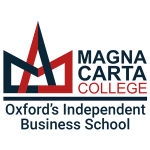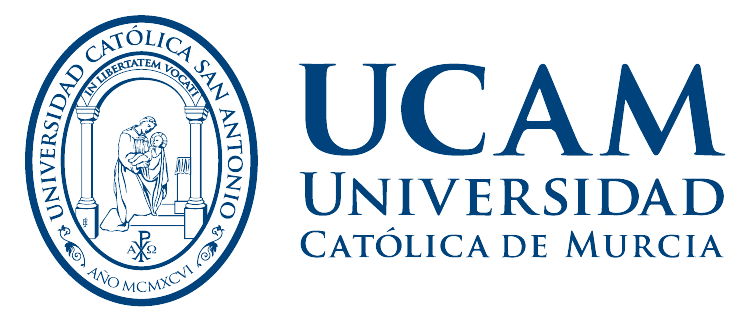MBA in
Human Resource Management
The MBA programme in Human Resource Management provides a solid foundation in management and leadership, focusing on key HR principles. It equips students to navigate talent acquisition, employee development, and organisational behaviour, preparing them to lead teams effectively in a dynamic, global workplace.

The MBA programme in Human Resource Management from Magna Carta College, in collaboration with UCAM, provides a comprehensive educational experience, equipping participants with essential skills and insights for effective HR management. This programme emphasises strategic thinking, enhancing organisational performance, and fostering leadership within the global HR landscape.
Students will explore key areas such as talent acquisition, employee engagement, performance management, and organisational development. A significant strength of the programme is its focus on evidence-based practices and advanced research, addressing the complexities of modern human resource management. This approach promotes adaptability, inclusivity, and strategic problem-solving in a dynamic, global market.
The curriculum offers a global perspective, demonstrating how organisations can leverage HR resources to gain a competitive advantage. Overall, the programme prepares future leaders to navigate the intricate dynamics of human resource management, going beyond traditional approaches to develop effective, well-rounded decision-makers.
Programme Modules
The programme includes the following modules: (CO: Compulsory; OP: Optional; MD: Master’s Dissertation;)
This module provides an in-depth exploration of financial markets, focusing on essential concepts in global finance. Students will analyze money flow, corporate investments, and tax implications, examining key areas like investment decision-making, risk and return, and the valuation of bonds and equities. Emphasis is placed on finance in international firms, including foreign exchange risk and financial statement analysis. The course also covers asset valuation, including intangibles and financial obligations. By the end, students will gain critical skills in cash flow analysis, equipping them to navigate financial markets effectively.
Objective of this Module:
- To understand how the numerous financial markets are connected.
- To appreciate the importance of such issues as taxation, transfer pricing, and foreign investment on the global flow of funds.
- To be able to measure the financial returns from investment.
- To be able to value a business.
- To examine the risks associated with foreign investment and to appreciate the techniques for managing the risk.
This module provides an in-depth overview of international marketing, equipping students with core concepts and strategies for global competition. Key areas include the marketing mix, segmentation, targeting, and positioning, with a focus on branding through the Customer-Based Brand Equity (CBBE) model. Emphasis is placed on marketing strategy, adaptability, and innovation. The module also covers advertising, strategic communication within the Integrated Marketing Communications (IMC) framework, and consumer research to analyze behavior and trends. Students will develop skills in creating international brand communication strategies tailored to diverse cultural contexts, with attention to marketing ethics.
Objective of this Module:
- To understand international marketing thought’s historical development from its roots in classical economics in the USA to the normative tradition promoted by academic/consultants such as Drucker, Levitt and Kotler in journals such as the Harvard Business Review.
- To generate understanding of popular normative marketing concepts such as the Marketing Mix and STP through application in practical case scenarios.
- To understand branding using Customer Base Brand Equity (CBBE)
- To appreciate the scope of marketing activity including Integrated Marketing Communications theory (IMC)
This module offers a thorough exploration of strategic management, covering core elements like unique activities, strategic positioning, and sustainable trade-offs. It addresses market positioning, competitive advantage through unique resources, and value chains across industries. The curriculum includes corporate strategy, focusing on resource allocation and control, as well as the international dimension, comparing strategies of multinational and national firms. Topics also include cooperative strategies, organizational learning as a competitive edge, and the influence of culture on strategy. The role of leadership in shaping and implementing strategy is emphasized throughout.
Objective of this Module:
- Evaluate the factors that need to be considered in analysing a firm’s external environment, the internal core competences of a firm and formulate a business strategy for a firm
- Understand the nature of corporate strategy.
- Understand the nature of international strategy
- Understand the different types of leadership
- Understand the relationship of leadership to strategy
This module explores the impact of structure and HRM on corporate success, emphasizing organizational design and the interconnection between individuals, the organization, and the environment. Key topics include labor market dynamics, recruitment, job design, and selection methods, with a focus on competency frameworks and psychometric testing. Strategic HR development is covered through training, performance management, and succession planning. The module also examines employee participation, relations, and reward systems, highlighting the influence of national cultures on HRM practices and the transfer of HR principles across borders.
Objective of this Module:
- Discuss critically the relationships between personnel management, employee relations and human resource management [HRM].
- Understand the nature of national cultures and their comparison with institutional and other differences between nations relevant to HRM.
- Evaluate the impact of internal and external (national and international) labour markets on the kinds of human resource strategies drawn up by organizations.
- Understand the impact of cultural differences on the processes of management
- Evaluate different methods of recruiting, selecting, developing and training staff cross-nationally.
This module provides an overview of the research process, starting with formulating research questions and writing effective proposals. Students will conduct a thorough literature review and explore both qualitative and quantitative research methodologies. Key topics include data collection, analysis techniques, and structuring research logically. Content analysis will be introduced as a method for interpreting textual data. Additionally, students will learn the thesis writing process, acquiring the skills necessary to conduct and present high-quality research.
Objective of this Module:
- Be able to devise a Research Question
- Be able to design and propose a viable research project
- Be able to understand the different methodologies employed in international management research
- Be able to make an informed choice of data collection methods for a given research area or research question
- Present research results in a systematic manner, write and structure a dissertation
This module applies the knowledge of psychological science to professional organizations. Organizational Psychology course focuses on workplace psychology, the study of how employees react to their work settings, analysis of human relations and its relationship to organizational effectiveness through planned change and technological development. The module in this concentration prepares students to understand employee’s behaviours in organization, create a safer workplace environment, and improve productivity.
Objective of this Module:
- Acquire adequate knowledge of the concepts and theoretical models of organizational psychology
- Learn major dimensions of IO psychology, quality of employee’s life, personal decisions, training, teamwork and leadership within its ethical and legal framework.
- Understand the principles of Organizational behavior with complete understanding of interpersonal interaction in organizations and related issues.
The module aims to explore approaches to managing conflict and change in the workplace. The module’s contents consider theory and research as well as practical management tools and techniques for dealing with conflict and change. However, it is designed to facilitate experiential learning through structured workshop activities, negotiation exercises and group assignments. Learning will be reinforced through reflection and self and peer evaluation.
Objective of this Module:
- Demonstrate an understanding of the causes of conflict in organizations and different mechanisms for its management
- Critically analyse different frameworks and methods of organizational change
- Identify the major processes and practices that underlie successful and unsuccessful change
- Diagnose the dynamics of environmental and organizational change
- Apply conflict management, concepts and theory to the real-world situation
Students will be required to undertake their dissertation on a relevant topic, as agreed by the Programme Director/Dissertation Coordinator and student. It emphasizes the development of research questions, methodology, and critical analysis skills. Students will engage in literature reviews, data collection, and analysis, culminating in the production of a comprehensive dissertation. This module will contribute to enhancing students’ ability to conduct autonomous research and provide novel insights into their area of research.
Objective of this Module:
- Plan and manage a project
- Define the aims of this project
- Identify the data sources and methods appropriate to conduct the project
- Identify the potential pitfalls to conducting such projects
- Execute the dissertation plan
Key highlights of course
- Flexible Scheduling for Professionals
- Live Interactive Learning
- Strong Focus on Analytical and Strategic Thinking
- Comprehensive Career Services
- Relevant Curriculum Tailored to Industry Needs
- Global Perspective on Business Practices
- Global Perspective on Business Practices
- Lifelong Learning and Alumni Network
- Leadership and Management Training
- Entrepreneurial Thinking and Innovation
Interested? Let us Contact You
Meet our Faculty

Professor David Faulkner, Academic Dean
In today’s globalised world, advanced business education is crucial for success. Our MBA programme at Magna Carta College, in partnership with UCAM, provides you with the skills and knowledge to thrive in leadership or entrepreneurial roles.
At Magna Carta College, we focus on empowering students with the qualities needed to stand out in a competitive job market. Join our supportive learning community and take the next step towards a successful career.
We invite you to join our transformative learning
environment, dedicated to empowering and
guiding you on your journey towards a bright and
successful future!

Maggie Faulkner
Head of Partnerships

Murray Cooper
Programme Lead | Head of Quality

Dr Ali Raza Nemati
Deputy Programme lead / Lecturer

Sumbhal Manzoor
Lecturer

Dr. AR Shahid
Lecturer
Career Advancement with our
MBA programme in Human Resource
Our Master of Business Administration (MBA) in Human Resource Management program is crafted to provide you with the specialized skills necessary for a successful career in human resources within diverse organizational settings. This program focuses on equipping you with expertise in talent management, organizational development, strategic HR planning, and employee relations.
The curriculum blends theory with hands-on, practical applications, ensuring a comprehensive understanding of HR functions aligned with broader business objectives. Through this MBA, you will develop leadership skills, strategic thinking, and advanced decision-making abilities essential for managing and nurturing talent in a dynamic and competitive global market.
Upon completion, graduates are prepared to assume senior HR roles, consult on organizational development, or drive strategic change initiatives within companies, contributing to both employee and organizational success. This program fosters critical analysis and innovative problem-solving, positioning you to thrive as an HR leader in today’s ever-evolving business landscape.
FAQs
An MBA (Master of Business Administration) is a graduate degree that provides a comprehensive understanding of various business functions, including finance, marketing, operations, and human resources. In our program, you’ll also explore specialized areas such as AI and Blockchain, Healthcare systems, Marketing, HR Management, Finance and Accounting, Global management and Supply Chain Management. Additionally, MBA programs enhance your soft skills, like leadership and communication, equipping you to channelize complex business environments effectively.
The level of challenge can vary depending on your prior experience and commitment. While the coursework is designed to be rigorous, it also offers ample support to help you thrive. The programme encourages both personal and professional growth.
The duration of our MBA programme is 1 year.
**Mode of Study**
The MBA programme is available in various formats to accommodate different learning preferences, including online learning, which allows you to study entirely through virtual lectures and resources; blended learning, which combines online and in-person sessions; and flexible distributed learning, enabling you to progress at your own pace with access to digital materials, making it ideal for busy professionals.
Our MBA programme offers a variety of specialized subjects, including AI and Blockchain, Healthcare Systems, Strategic Marketing Management, Human Resource Management, Accounting and Finance, Global management and Supply Chain. These courses are designed to equip you with the skills necessary to succeed in a rapidly changing business environment.
The online MBA programme will utilize Moodle as the primary Learning Management System (LMS), which facilitates access to high-quality learning materials. Additionally, the Student Support Desk will provide responsive support services, ensuring that students receive timely assistance. Vtiger CRM will be employed for personalized communication throughout the academic journey. Together, these resources are pivotal in helping students achieve their educational goals and succeed in the MBA program.
Many organizations today value the skills and competencies that candidates bring to the table, regardless of whether their degree was earned online or in a traditional classroom setting. Especially when the online MBA is from a reputed institution, employers recognize the rigor and dedication involved in completing such a program. Our online MBA is specifically tailored to equip you with practical, in-demand skills that will enhance your career prospects and prepare you for success in the competitive job market.

I chose Magna Carta College because of its convenient learning process, which was suitable for my working schedule. I would definitely recommend MCC to all my peers. I had easy access to the learning program, documentation, etc. In August 2019, the qualification helped me to join my current company, with an increase in salary and status.
Umid Z., Level 7 Diploma





